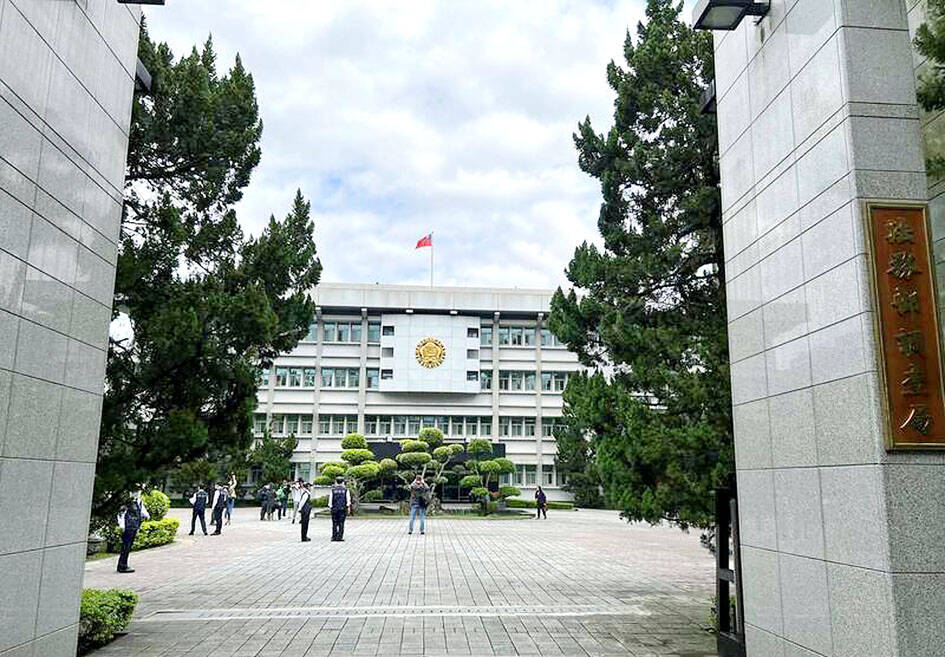China simultaneously employed cognitive warfare while conducting military drills around Taiwan on Monday, the Ministry of Justice Investigation Bureau insinuated yesterday
The Chinese People’s Liberation Army (PLA) early on Monday launched military drills code-named “Joint Sword-2024B” involving its army, navy, air and rocket forces in the Taiwan Strait and areas to the north, south and east of Taiwan. They ended at 6pm.
The bureau said it had found several false reports online, such as untrue assertions of Taiwan’s military failing to respond quickly and that ships carrying liquefied natural gas had been forced to turn around.

Photo: Taipei Times
The messages formed “cognitive manipulation” by “overseas hacking armies,” who hacked social media pages, the bureau said in a statement, without directly blaming China.
The bureau reminded the public to secure their social media accounts and verify information online to avoid falling victim to cognitive manipulation.
Separately, a National Security Bureau report to the Legislative Yuan said that the Chinese Communist Party (CCP) has stepped up measures to increase pressure on Taiwan and sow internal division since President William Lai’s (賴清德) inauguration ceremony on May 20.
Beijing’s inclusion of the China Coast Guard in its military drills was aimed at increasing the exercises’ force projection, the report said.
China is also attempting to “squeeze” Taiwanese farmers by weaponizing the economy and highlighting that selling agricultural produce to China pays better, the report said.
Diplomatically, China is stepping up efforts to malign and distort UN Resolution 2758 and emphasize that it is the only legitimate government of China to deter Taiwan’s participation in international bodies, it added.
The CCP has issued “22 guidelines” designed to punish “die-hard” Taiwanese separatists, hoping to suppress any mention of Taiwanese independence, the report said.
Beijing is encouraging the Chinese public sector to “prettify” China’s ideology through short videos on the Internet so that more Taiwanese would recognize the validity of CCP rule, it said.
The CCP is also augmenting its cyberwarfare capabilities by hacking the government to paralyze its Web sites, conducting digital corporate espionage and using artificial intelligence technology to strengthen its “united front” rhetoric, the report said.
The bureau said it would work with partners to foster joint security and, with the help of international like-minded partners, step up efforts to gather intelligence on critical decisions made by the CCP and the PLA.
Additional reporting by Reuters

MAKING WAVES: China’s maritime militia could become a nontraditional threat in war, clogging up shipping lanes to prevent US or Japanese intervention, a report said About 1,900 Chinese ships flying flags of convenience and fishing vessels that participated in China’s military exercises around Taiwan last month and in January have been listed for monitoring, Coast Guard Administration (CGA) Deputy Director-General Hsieh Ching-chin (謝慶欽) said yesterday. Following amendments to the Commercial Port Act (商港法) and the Law of Ships (船舶法) last month, the CGA can designate possible berthing areas or deny ports of call for vessels suspected of loitering around areas where undersea cables can be accessed, Oceans Affairs Council Minister Kuan Bi-ling (管碧玲) said. The list of suspected ships, originally 300, had risen to about 1,900 as

Japan’s strategic alliance with the US would collapse if Tokyo were to turn away from a conflict in Taiwan, Japanese Prime Minister Sanae Takaichi said yesterday, but distanced herself from previous comments that suggested a possible military response in such an event. Takaichi expressed her latest views on a nationally broadcast TV program late on Monday, where an opposition party leader criticized her for igniting tensions with China with the earlier remarks. Ties between Japan and China have sunk to the worst level in years after Takaichi said in November that a hypothetical Chinese attack on Taiwan could bring about a Japanese

MORE RESPONSIBILITY: Draftees would be expected to fight alongside professional soldiers, likely requiring the transformation of some training brigades into combat units The armed forces are to start incorporating new conscripts into combined arms brigades this year to enhance combat readiness, the Executive Yuan’s latest policy report said. The new policy would affect Taiwanese men entering the military for their compulsory service, which was extended to one year under reforms by then-president Tsai Ing-wen (蔡英文) in 2022. The conscripts would be trained to operate machine guns, uncrewed aerial vehicles, anti-tank guided missile launchers and Stinger air defense systems, the report said, adding that the basic training would be lengthened to eight weeks. After basic training, conscripts would be sorted into infantry battalions that would take

DEEP-STRIKE CAPABILITY: The scenario simulated a PLA drill that turned into an assault on Taiwan’s critical infrastructure, with the launchers providing fire support Taiwan yesterday conducted this year’s first military exercises at Longsiang Base in Taichung, demonstrating the newly acquired High Mobility Artillery Rocket System’s (HIMARS) ability to provide fire support and deep-strike capabilities. The scenario simulated an attack on Penghu County, with HIMARS trucks immediately rolling into designated launch areas and firing barrages at the Wangan (望安) and Cimei (七美) islands, simulating the provision of fire support against invading forces. The HIMARS are supposed to “fire and leave,” which would significantly increase personnel and equipment survivability, a military official said. The drill simulated an exercise launched by the Chinese People’s Liberation Army (PLA) Eastern